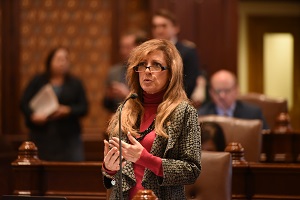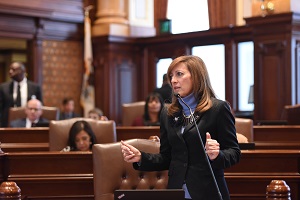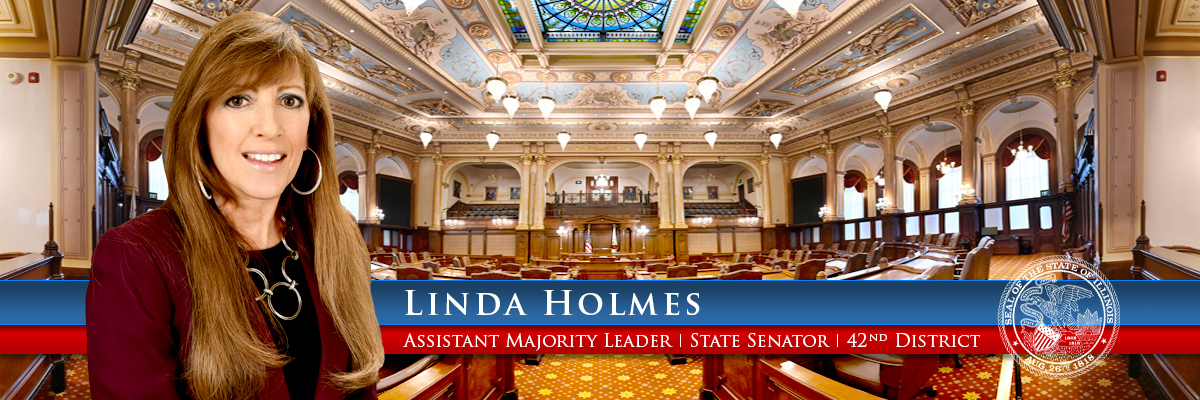
Holmes demands budget answers
- Details
- Category: Latest
SPRINGFIELD — In a senate hearing with Acting Director Anna Hui of the Illinois Department of Labor, State Sen. Linda Holmes, D-Aurora, asked what cuts could be made in the Department of Labor to balance the $4.6 billion out of balance budget.
“Being that the governor’s proposed budget was $4.6 billion out of whack and we’re now finding that that number might be more optimistic than it’s going to be, I would appreciate hearing from the department itself where you would be most willing to make those cuts,” Holmes said. “Where would you like to see those cuts if we are in a position where they have to be made?”
“We are not in the position to speculate about where those cuts might come from,” Hui said, to which Holmes replied: “Okay. Let’s call that nonresponsive.”
This week, Sen. Holmes and her fellow Democrats in the Senate have asked more than ten heads of state agencies what they would do should they be asked to cut their agencies’ budgets. In this year’s budget proposal, Gov. Rauner put forward a plan that spends $4.6 billion more than it collects in revenue. Rauner’s FY 18 budget proposal relies on the General Assembly to close this $4.6 billion gap by proposing new revenues or making cuts to programs.
“Gov. Rauner has been asking the General Assembly to give him the authority to make budget cuts for months. I would expect the governor’s agency heads to have some cuts already in mind,” Holmes said. “Clearly that is not the case.”
Director Hui is one of at least sixteen other state agency directors who have appeared before the Illinois Senate this week. None have suggested cuts to their departments’ budgets.

Senator Holmes, Treasurer Frerichs partner to deliver $30,000 to local charities through I-Cash program
- Details
- Category: News
SPRINGFIELD – State Sen. Linda Holmes, D-Aurora, announced today that a joint effort with Illinois Treasurer Michael Frerichs’ office is delivering $30,000 in unclaimed property to two Aurora charities, the Salvation Army and First Christian Church. The two organizations are each claiming 20 percent of a $78,000 estate from an Aurora woman who passed away in 1991. After the original owner passed away, her bank accounts were eventually turned over to the state.
“The Illinois Treasurer’s I-Cash program is an important consumer protection that secures lost bank accounts and other unclaimed property for as long as it takes to return it to its rightful owners,” Holmes said. “I applaud Treasurer Frerichs for expanding efforts to locate rightful owners. It is an honor for us to help in the effort, and it is especially rewarding when the assets go toward a good cause.”
Illinois Treasurer Michael Frerichs is currently safeguarding $2.7 billion in recovered cash belonging to millions of Illinois residents. Shortly after taking office in 2015, Frerichs launched an intensive effort to track down the owners of large properties that had languished for years, especially those belonging to nonprofit organizations, employers, and estates. The Treasurer’s office is partnering with Holmes because residents of Aurora and Naperville have more than $18 million and $21 million in unclaimed property respectively, among the highest for any city in the state.
“I applaud legislators like State Senator Holmes for working with my office to return to her constituents what is rightfully theirs,” said Frerichs. “We hope more legislators and constituents take advantage of this program. Our office is holding tens of millions from the municipalities in Sen. Holmes’ district. To find out if you have money or property that belongs to you, please visit the treasurer’s office website at www.illinoistreasurer.gov/ICASH.”
Through the I-Cash program, tens of thousands of Illinois residents discover and claim property each year, and the average claim paid is $2,900. A number of much larger properties remain to be claimed in the area, including: $91,000 from a CD account in Aurora, $110,000 from a savings account in Naperville, $104,000 from an investment account in North Aurora, and $100,000 in life insurance benefits in Montgomery.
Discovering and claiming unclaimed property is fast, free and confidential at illinoistreasurer.gov/icash. The Treasurer’s Office encourages individuals, businesses and nonprofits to check back every six months since hundreds of thousands of properties are added throughout the year. Claimants with questions or concerns can email

Lack of budget threatens domestic violence shelter
- Details
- Category: Uncategorised
SPRINGFIELD – State Sen. Linda Holmes, D- Aurora, highlighted the consequences of Illinois’ budget impasse in her district.
“The state has not had a balanced budget since Governor Rauner took office, and the impasse has hurt Illinoisans of all walks of life,” Holmes said. “The Illinois Constitution states that the governor must provide the legislature with a balanced budget. He has not done so and Illinois residents have suffered as a result. In his public remarks, the governor has continually tried to minimize the negative effects of going without a budget, but my constituents are struggling.”
Mutual Ground, a shelter and service provider for victims of domestic violence and sexual assault, signed a contract with the Illinois Department of Human Services for fiscal year 2017. The organization has yet to be paid this year. Michelle Meyer, executive director of Mutual Ground, estimates that the organization is missing over $370,000 in state funding.
“Mutual Ground not only provides vital services for victims of crime, but it is an organization that employs 43 people in our community,” Meyer said. “We are consistently being asked to foot the bill for services the State contracts us to provide. Human services are crucial to the overall health of our State and are unfortunately some of the most negatively impacted by our State leaders’ inability to work toward a resolution. This cannot continue"
Mutual Ground offers intervention, prevention, and continuing support services for victims of domestic and sexual violence. The nonprofit was not covered in the stopgap spending plan and leaders have not been told when or if they will receive funding for the current year. The uncertainty has caused the departure of 10 staff members due to attrition and layoffs. As a result, Mutual Ground has been forced to turn away people in need of services.

Senator Holmes votes to streamline wasteful government
- Details
- Category: New Releases
SPRINGFIELD – To make local government more efficient and ease the property tax burden on her constituents, State Sen. Linda Holmes, D-Aurora, voted in favor of SB3, a bill that grants counties the ability to cut or consolidate local units of government. Previously, only DuPage, Lake, and McHenry Counties were able to consolidate local government units in this way. This bill extends that ability to all counties in the state.
“The property owners in my district have suffered under an increasingly large property tax burden over the years,” Holmes said. “Property taxes rise for numerous reasons, but one common-sense way to control and lower them is to grant local governments the ability to consolidate and eliminate unnecessary and wasteful units.”
With over 7,000 units of local government, Illinois has more than any other state in the country. This legislation is a step toward lowering that number and streamlining government.
Having passed the Senate as part of the “grand bargain” agreement, SB3 awaits the approval of the rest of the bills in the package before moving on to the House of Representatives.
More Articles …
Page 72 of 85




